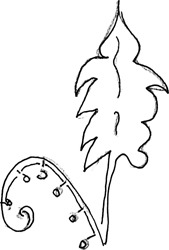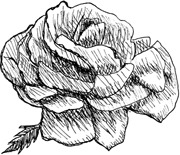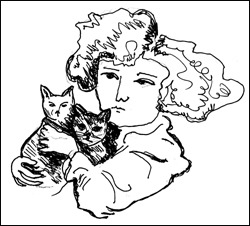

After the disappointment of this “book,” I can offer you the small solace of some books that I can vouch are actually illuminating and you won’t have to work very hard to understand why. You like reading or you wouldn’t be here. But we live in a world where our attention spans last less than the length of an Internet ad. So I am here to help by boiling down some of what I think of as classics to a paltry but amazingly descriptive few lines. It is literally the least I can do. Without further ado, the squint-and-you-miss-it Little Book of Littler Book Reviews.
Blood Meridian, or The Evening Redness in the West
War was always here. Before man was, war waited for him. The ultimate trade awaiting its ultimate practitioner.
—Cormac McCarthy (1933–)
A violent tween joins a horrific band of doomed scalp hunters and the fun starts there. Moby-Dick in the Old West with beheadings.
Cormac McCarthy makes himself hard to read. Women in general are not huge fans. He believes that punctuation is “tyranny,” and he would never use a semicolon. Quotation marks are out of the question, so when you read him, you must do a lot of heavy attributive lifting. That and the fact that lots of it is in Spanish, which he learned to write for this book. Cormac has been poor and struggling as well as granted with genius money. It doesn’t seem to change his outlook. And he makes no bones that he does not care for authors who do not deal with death. He is also reclusive in the sense that he cares not at all about doing interviews to promote his work. In our post-Kardashian world, that makes him a hermit. He did go on Oprah, where he looked furtive, and she actually posed the probing question of how did he get his ideas. Contentious late-in-life genius or overreaching genre-ist with a violence fixation? This is your call, baby. You must deal with lots of death in this one, so saddle up and amigo, buena suerte.
All pleasures must be paid for, do not despise those that state their price.
—Amin Maalouf (1949–)
A tragic story of mistaken identity and revenge set in colonial Lebanon full of sheikhs and beauties. A strangely uplifting work scented with pine and coffee.
Amin Maalouf is a Christian author from Lebanon. He was a journalist who covered the fall of Saigon and interviewed Indira Gandhi. He left Lebanon for good during the 1975 civil war and moved to Paris and now writes in French. He has been wildly celebrated and definitely brings a unique, colorful, intellectual perspective to religion, race, and identity. As he puts it: “The fact of simultaneously being Christian and having as my mother tongue Arabic, the holy language of Islam, is one of the basic paradoxes that have shaped my identity.” Paradox is his chocolate box.
In his blue gardens men and girls came and went like moths among the whisperings and the champagne and the stars.
—F. Scott Fitzgerald (1896–1940)
Shallow, brittle rich people drink, dance, and have unrepentant sex with the underclass in the Roaring ’20s. Just desserts are served.
F. Scott Fitzgerald was a drunk married to a crazy person. He was from a notable family but was always after money. He hobnobbed with all the heavyweights of the ’20s and sold his soul to Hollywood. He made it to the semi–rock star age of forty-four. He wrote Gatsby in the ’20s, but it was not a commercial success till the ’40s, when soldiers overseas were given copies. Somewhere around 150,000 books were handed to GIs during WWII. Then it became part of high school curriculums in the ’50s and voilà, the Great American Novel was reborn. Fitzgerald knew all about his subject matter, the new rich: he lived on Long Island where he soiréed; when in Europe, he and his wife, Zelda, sponged off many rich friends. He was a mordant observer of the rich while at the same time something of an admirer and sycophant. He certainly comes closer than any other novelist in capturing hedonism, which he practiced, and as well as despair, which he became an expert on. As he says in “The Rich Boy”: “Let me tell you about the very rich. They are different from you and me. They possess and enjoy early, and it does something to them, makes them soft, where we are hard, and cynical where we are trustful, in a way that, unless you were born rich, it is very difficult to understand.”
Bruges was his dead wife. And his dead wife was Bruges. The two were untied in a like destiny. It was Bruges-la-Morte, the dead town entombed in its stone quais, with the arteries of its canals cold once the great pulse of the sea had ceased beating in them.
—Georges Rodenbach (1855–1898)
Depressed neurotic weirdo seeks replacement for dead wife, then freaks out when she is an uncontrollable bummer.
Georges Rodenbach is considered a symbolist, which is to say not a realist. Feeling, art, and aesthetics come first before authenticity. His tomb in the Père Lachaise Cemetery in Paris with his green corpse spirit flying out of the ground is the most over-the-top spookarama this side of the Haunted Mansion in Disneyland. The symbolist movement included writers (Gabriele D’Annunzio), playwrights (Nobel Prize winner Maurice Maeterlinck), painters (Gustave Moreau), poets (Arthur Rimbaud), philosophers (Arthur Schopenhauer), and composers (Claude Debussy). This is the first novel to be printed with photos; that, mon ami, is très moderne.
If you want to keep a secret you must also hide it from yourself.
—George Orwell (1903–1950)
Trouble and torture in the future for truthseeker Winston Smith when the past is denied and the news is written by the government.
Orwell lived it. He was a poor rich person who was sent to a hideous boarding school that he hated, was a police superintendent in Burma, lived among the wretched poverty and squalor of London and Paris, was shot in the throat in the Spanish Civil War, wrote literary criticism, was married while in the hospital, smoked like a chimney, and suffered and died of TB at the age of forty-six. He also wrote loads of articles, pieces, essays, columns, and diatribes, including how to make a perfect cup of tea and the immortal classic Animal Farm: “Some animals are more equal than others.” Plus the Big Boy, 1984. He was famous and well off when he passed but had no idea how huge 1984 would become as the novel of dystopia. He would have been thrilled. Maybe not so thrilled that there is an inane reality show with people under constant surveillance called Big Brother. Neither are we, for that matter.

I was thinking, “So, I’m Emperor, am I? What nonsense! But at least I’ll be able to make people read my books now.”
—Robert Graves (1895–1985)
Stuttering Roman noble is forced to take over the Empire after his nephew, the over-the-top pervert emperor Caligula, is rubbed out.
Graves was severely wounded at the Battle of the Somme in WWI. He came home shell-shocked and exhausted from the Spanish flu, the virus that wiped out somewhere in the neighborhood of two and a half percent of the world’s population. He was pals at Oxford with T. E. Lawrence—yes, Lawrence of Arabia—with whom he chatted about poetry and apparently played pranks. That had to be a good time. Graves wrote a popular bio of Lawrence and then his own memoir of the war, Goodbye to All That. He went through a couple of wives, moved to Majorca, and used his extensive knowledge of classical literature and history to write I, Claudius. It was a hit, so of course he said he wrote it for money so no one could enjoy themselves. Despite his snipe for it, it is well witty.
I had done either too much coke or too little, a constant problem in my life.
—James Crumley (1939–2008)
Chandler with snow tires. And a giant duffel bag full of drugs and guns in the trunk.
Crumley was never a bestseller. He put it more starkly: “I’m not middlebrow and middle class. Sure, I’d like it if more people read the books. My children would like it. My ex-wives would like it. But that’s just not what I’m about.” The heir to Chandler and all that is hard-boiled, he had five wives and an enthusiasm for alcohol. He served in the army in the Philippines and wrote his only non-detective novel, One to Count Cadence. His detectives are hard drinking and very druggy, in reflection of his own tastes, we presume. Spent forever writing screenplays that never got made. He had to be satisfied with being a brilliant stylist.
“The Sneetches” The Sneetches and Other Stories
Now, the Star-Belly Sneetches had bellies with stars. The Plain-Belly Sneetches had none upon thars.
—Dr. Seuss (1904–1991)
Fury on the beach when race and identity are explored in this hilarious Holocaust allegory for kids.
The greatest of all children’s writers—sorry, J. K. Rowling. Theodor Geisel’s middle name was Seuss, his family was from Germany, and they pronounced it Zoice. He was an indifferent scholar at Dartmouth, but he loved to draw. He was a struggling artist living in a walkup on the Lower West Side when he did a cartoon of a knight with a can of bug spray saying, “Darn it all, another dragon. And just after I’d sprayed the whole castle with Flit!” The wife of an ad exec saw the cartoon, and he started a cartoon ad campaign. The slogan was “Quick, Henry, the Flit!” The campaign was super popular; it was the “Got milk?” of the way back. He was an ad man for thirty years while writing various children’s books. Then in 1957, The Cat in the Hat sold a million copies, and he was now a brand as well as an author. He felt strongly that kids should read, think for themselves, and not be patronized. Generations have grown up on his humanist poetry. Dr. Seuss wrote children’s books about the power structure (Yertle the Turtle), nuclear war (Horton Hears a Who and The Butter Battle Book), and the environment (The Lorax). His wordplay and fantastical names are part of the culture now. He gave us nerd. Most of all, he encouraged everyone to try independent critical thought, “Think left and think right/and think low and think high/Oh, the THINKS you can think up if only you try!”
Manuscripts don’t burn.
—Mikhail Bulgakov (1891–1940)
Moscow goes crazy when the devil appears with a talking cat.

Bulgakov was first a doctor who was horribly injured in WWI and became a morphine addict. He joined the White Army but was forced to be a physician for all sides in the Communist Revolution. He then became a journalist, later moving to Moscow, and finally a dissident playwright. His plays were popular, but the Communist powers were always banning him. Except, most extraordinarily, the dictator and genocidal strongman Josef Stalin. Stalin loved his work and said of him that he was above labels like left and right. The secret police interrogated him and confiscated his work. Desperate and broke and unable to get his plays produced, he wrote Stalin and begged, “Let me out of the Soviet Union, or restore my work at the theaters.” Stalin actually phoned him, which must have been startling, and got him a job at a small theater. Bulgakov married his third wife, Yelena Shilovskaya, and she is the inspiration for Margarita in the novel. In the novel, Margarita makes a deal with the devil to be with her beloved, the Master, who is in an institution where he believes his lengthy book has been burned. In the end, we find out a truth about manuscripts. Originally written before Bulgakov’s early death in 1940, the book was finally released in two parts in the ’60s. Marianne Faithfull got hip to it and gave it to her boyfriend, Mick Jagger, who ran out and wrote “Sympathy for the Devil” after reading it. This may be the most popular Russian novel of all time.
There are times when I’d rather converse with a crazed mugger than reason with myself.
—Iris Owens (1929–2008)
Starts with the line, “I left Claude, the French rat.” Then we are off to the madhouse. Snarking jacket required.

Iris Owens went to Barnard and then moved to Paris, where she took up with Scottish Beat writer Alexander Trocchi. She wrote kinky art porn under the name Harriet Daimler. She had loads of admirers, such as Beckett, as she was witty and sexy, but outside of erotica, she simply could not be bothered to write. Prodded to pen this frenzied short novel, she hated her publisher and only wrote one other book. She said about herself, “I was very involved in being an elegant failure.”
There is a taint of death, a flavor of mortality in lies—which is exactly what I hate and detest in the world—what I want to forget.
—Joseph Conrad (1857–1924)
Mayhem in colonial Africa ensues when a corporate underling is sent up a steamy jungle river to stop a crazed boss.
Joseph Conrad was born into a Polish family when Russia was dominating Poland. His dissident parents were forced into exile in frosty Russia, where they subsequently died. Conrad was then raised from twelve by his kindly uncle, who had him tutored in Latin, Greek, geography, and such. Young Joseph was an impatient student who vowed to sail the world and see Africa. His uncle approved of him becoming a seaman, as it would help him avoid being pressed into the Russian service. He sailed with the French, was a smuggler and gunrunner, and tried to kill himself rather than face a gambling debt he could not pay. He later joined the British merchant service, where he changed his name to Joseph Conrad. Plagued with depression and gout, he steered a paddle steamboat down the Congo for the Belgians and saw firsthand what the colonial powers were doing away from the judgmental prying eyes of “civilization.” This novel is disturbing and haunting and controversial well after Conrad’s day. The book was published in 1899. In 1975, Chinua Achebe, the noted Nigerian novelist and educator, gave a lecture at the University of Massachusetts called “An Image of Africa: Racism in Conrad’s Heart of Darkness” in which he called Conrad “a thoroughgoing racist.” Achebe says Conrad is a good writer, but “Although he’s writing good sentences, he’s also writing about a people, and their life. And he says about these people that they are rudimentary souls. . . . The Africans are the rudimentaries, and then on top are the good whites. Now I don’t accept that, as a basis for . . . as a basis for anything.” You make up your own mind. The trip down the river to find unhinged corporate despot and jungle kingpin Mr. Kurtz is unique. You will remember Conrad’s evocation of lonely madness.
Unfortunately your letter crossed with mine.
—Wolfgang Bauer (1941–2005)
Hilariously absurd convoluted novel about something or nothing.
Bauer was an Austrian playwright and a young one. At twenty, he had his first play, Der Schweinetransport, or The Pig Transport, produced. Bauer drank like a fish and smoked like a wildfire and wrote loads of plays. It is he who coined the term Theater of the Absurd. Bauer deals in the surreal and makes little to no effort to help you along. His first hit was Magic Afternoon, the tale of bored kids who go wild with violence to alleviate their boredom. The conservative Austrians were not loving him and labeled him an enfant terrible and later an experimental playwright. Bauer would have none of it and did his own thing. The Feverhead is his only novel. Good luck. By the way, it is laugh-out-loud funny.
The Adventures and Misadventures of Maqroll
When I’m on land, I suffer a kind of restlessness, a frustrating sense of limitation verging on asphyxia. It disappears, though, as soon as I walk up the gangplank of the ship that will take me on one of those extraordinary voyages where life lies in wait like a hungry she-wolf.
—Álvaro Mutis (1923–2013)
Heart of Darkness with drinking and ghosts and sex.
Mutis is surely within the Latin literature tradition, but he loved Proust and Dickens, and his identity is mixed in with his dreams and failures. He imagined the character when he was nineteen and finished the series in his sixties, when it was first published. Mutis was a rich kid who shuttled between Belgium and his grandfather’s plantation. He was a salesman of TV shows for Hollywood studios and did the voiceover for The Untouchables for all of Latin America. He spent years of his life working as the PR guy for Colombian Standard Oil, riding up rivers and ending up in Mexico where, over the misallotment of funds he claims he was using to help friends in danger from Rojas Pinilla’s military dictatorship, he was chucked in jail for more than a year. This, Mutis claimed, was the most important chapter of his life: “And there is one thing you learn in prison, and I passed it on to Maqroll, and that is you don’t judge, you don’t say, that guy committed a terrible crime against his family, so I can’t be his friend. No, in a place like that one coexists. The judging is done by the judges on the outside.”
Perfume: The Story of a Murderer
He who ruled scent ruled the hearts of men.
—Patrick Süskind (1949–)
Super-creepy, demented perfumer wreaks havoc and homicide in Romantic eighteenth-century France.

Süskind is an odd sort of genius. He is a playwright, history student, linguist, TV writer, novelist, and would-be musician, but something was wrong with his hands. He moved to Paris, where he was supported by his parents, and studied in France, where he traveled through the perfume-making region gathering material for what would become Perfume. His first play, The Double Bass, is a monologue by the bass player, who is an ancillary player in the orchestra and in his own life. It was rejected for publication a bunch of times until it became a hit play. He then wrote Perfume, which was a worldwide smash bestseller and a strenuously mediocre movie. He started winning awards and just as quickly rejecting them. He went on to collaborate on two popular German TV shows but has not published a book in years. Personal and always an outsider, Süskind is funny and horrid and poignant.
The Manuscript Found in Saragossa
It is not science which leads to unbelief but rather ignorance. The ignorant man thinks he understands something provided that he sees it every day. The natural philosopher walks amid enigmas, always striving to understand and always half-understanding. He learns to believe what he does not understand, and that is a step on the road to faith.
—Jan Potocki (1761–1815)
Hanged man spins a web of overlapping tales of sex and magic.
The themes in Saragossa reflect Potocki’s own ceaseless inquisitiveness. Sex, magic, revolution, secret societies, philosophy, and the supernatural. Count Potocki was raised wealthy and learned eight languages, traveled the world, and studied everyone and everywhere he went. He met and hired Osman, his valet, in Turkey and began wearing a fez. Potocki sailed with the Knights of Malta against the Barbary pirates and led expeditions for Tsar Alexander. A Freemason and cohort of the occultist Cagliostro, he was the first Polish person to fly in a balloon, where he was joined by Osman and his dog Lulu. Purported to have helped start the French Revolution while he was frequenting the salons and secret places in Paris. He married twice; the mother of his second wife, Princess Julia Lubomirska, founded the Łańcut vodka distillery, which is still distilling. He suffered from melancholia, which we call depression. He split for his castle in Poland. Convinced he was a werewolf, he had for years been filing a silver knob shaped like a strawberry on top of a sugar bowl his mother had given him into a bullet. He had the bullet blessed by the castle priest and shot himself in the head. It is exhausting simply reading about his adventurous world. His life is as unbelievable and outrageous as this fabulous testament to his deep knowledge and crazed imagination.
Curious how people can go on doing the same thing day after day!
—Colette (1873–1954)
In sexy Belle Époque Paris, a wise, aging courtesan and a young louche rake find sex, love, and bien sûr plenty of misery.

Colette’s life is a novel. In fact, she wrote many novels about her amazing life. From the nineteenth century to the age of television, Colette got it on and got it done. She is the antithesis of her famous line: “People who are perfectly sane and happy don’t make good literature, alas.” She is the first Woman to be given a state funeral in France. She discovered Audrey Hepburn and put her in Gigi. She turned her husband’s estate into a hospital in WWI and was awarded a Chevalier of the Légion d’honneur. She performed in music halls and did a scandalous act that had girl-girl kissing, which caused a riot that the police had to quell. Colette helped Jews during WWII and hid her Jewish husband in the attic. She was a noted bisexual, had an affair with her stepson, wrote an opera with Ravel, and was buried with honors amongst the geniuses at Père Lachaise Cemetery. She wrote spicy stories about people who had spicy sex, something she was a spicy expert on. Colette lived long enough to attend a documentary of her own life, where she quipped, “What a wonderful life I’ve had.” We should all experience the scope of love and lusts and war that Colette endured and persevered through. But we don’t have the energy.
And must I, perchance, like careful writers, guard myself against the conclusions of my readers?
—Djuna Barnes (1892–1982)
You bloody tell me.
Djuna Barnes’s lifetime spans the twentieth century. Born in the 1890s to decidedly weird parents and a grandmother, she is the ultimate bohemian. Wald, her father, believed in free love and polygamy. Djuna had to work to help her family make ends meet. They also abused her sexually. She split to Greenwich Village to study art. She walked into the offices of the Brooklyn Eagle and said, “I can draw and write, and you’d be a fool not to hire me.” They made her a reporter. Djuna did first-person reporting, features, news stories, interviews, theatrical reviews, and her own illustrations for every paper in New York. In 1914, she did an article with photographs for the New York World magazine called “How It Feels to Be Forcibly Fed” when lots of Women suffragettes were on hunger strikes and were being force-fed. Waterboarding, anyone? She moved to Paris and interviewed James Joyce; she wrote plays, had affairs with men and Women; she was the life of the biggest party in that most amazing of places, Paris, during the 1920s, of which Gertrude Stein said, “Paris was the place that suited us who were to create the twentieth century art and literature.” Djuna Barnes wrote Nightwood after breaking up with the American sculptor Thelma Wood. She was staying out in the country at a house the residents called “Hangover Hall” that was being rented by famous art patron Peggy Guggenheim. She finished the book, and the poet Emily Coleman gave it to T. S. Eliot, the eminent poet and editor who was running Faber and Faber. He championed the book and wrote the foreword, but it was never a hit. She was forced back to New York, where she lived for another forty years, drinking and writing her revenge play about her family, The Antiphon.